 To start the autumn season on the Literary Sofa, I am delighted to welcome Jason Hewitt as the first author to appear twice in my Writers on Location series. I have got to know Jason in real life since he wrote about Arctic Norway, one of the settings for his acclaimed debut The Dynamite Room, and I’m impressed by his hands-on approach to location research and the results! In his new novel, Devastation Road, Jason masters a ‘setting in motion’ and I invited him back to share his experience of tackling a road novel. (My mini-review follows):
To start the autumn season on the Literary Sofa, I am delighted to welcome Jason Hewitt as the first author to appear twice in my Writers on Location series. I have got to know Jason in real life since he wrote about Arctic Norway, one of the settings for his acclaimed debut The Dynamite Room, and I’m impressed by his hands-on approach to location research and the results! In his new novel, Devastation Road, Jason masters a ‘setting in motion’ and I invited him back to share his experience of tackling a road novel. (My mini-review follows):
I think it’s fair to say that I don’t like doing things by halves. So when I decided that my second novel would be about a road trip it didn’t cross my mind that I might be able to do most of my research using Google Maps. Instead I took a plane followed by a train to the Bohemian Uplands of the Czech Republic, got off, rucksack over shoulder and set off, thinking to myself: ‘Right then, off we go!’
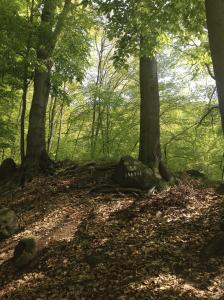
The trip took over a fortnight and lead me out through the northern Czech Republic into Poland and across Germany to Leipzig, before heading north; and, like Owen, large sections of it were done on foot. Nothing en route was wasted. Almost every scene location was found somewhere along the way, and everything I spotted I tried to include, whether it be a cattle shed that Owen sleeps in, apple orchards and rivers, or chopped down trees like a crop of seats, or even a boulder half hidden in a forest with a white painted face.
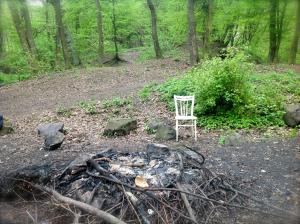
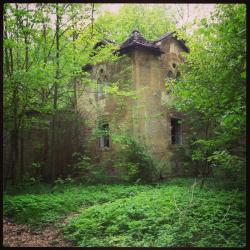
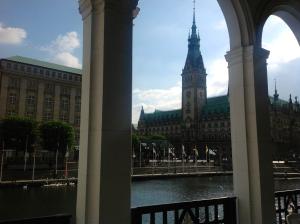
Thank you to Jason for this evocative insight into every aspect of the creative process behind the book.
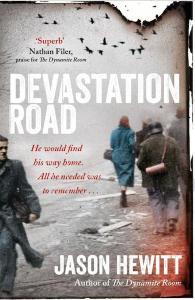
I am always struck by the number of novels set during/around World War Two – that makes it ever harder to find a fresh take but the publication of Devastation Road confirms that Jason Hewitt has done it twice. Owen is a character in whom the past and present are interwoven to great effect, playing with the fragility of memory (another popular theme done differently here). The writing has an immersive emotional and sensory quality that captures both beauty and horror; this is a heart-rending story with moments of tenderness and light amid the darkest suffering, desperation and brutality – some of which I cannot get out of my mind.
*POSTSCRIPT*
I didn’t finish all of my Summer Holiday TBR List whilst I was in France but I have now and next week I’ll be posting a round-up of my summer reading, with thoughts on those eight titles and others that deserve a mention. Thanks to those still consulting and sharing my Summer Reads 2015 – it’s lovely to hear that many readers found something they enjoyed.

